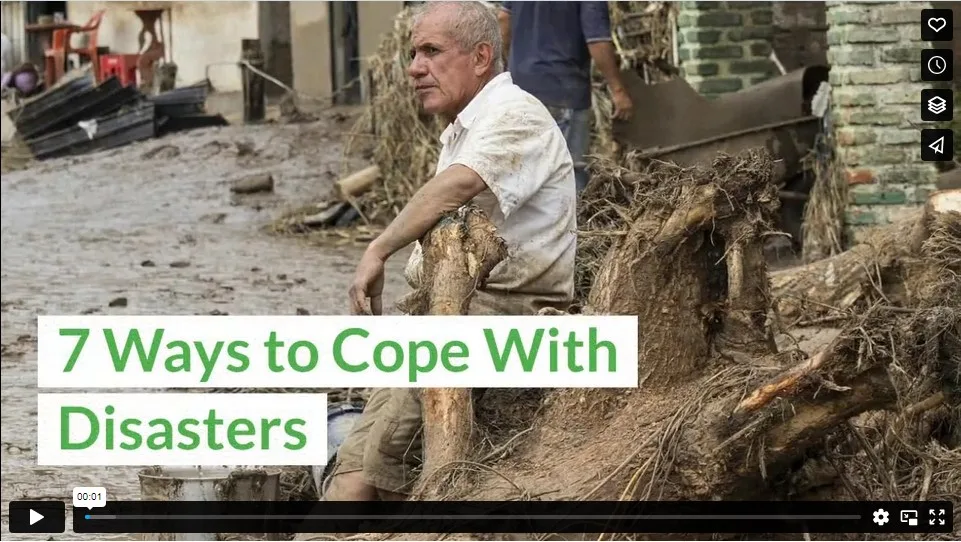Natural disasters, like hurricanes or tornadoes, can profoundly affect more than just your belongings. They trigger high stress levels, anger, and anxiety and can lead to post-traumatic stress disorder (PTSD). The loss of property or finances can contribute to your difficulty coping and add to your stress.
Because these events can affect entire communities, disrupting the lives of family and friends, you may be left without any social support. While many return to their typical lives and move on, you may find that difficult and be mentally stressed. Here are seven ways to reduce your trauma during and after a natural disaster.
1. Avoid Media Coverage of the Disaster
You can feel bombarded with radio, television, and social media coverage. Constantly reliving it through the news reports can increase your stress and anxiety. Reduce your exposure to the story, especially images, to help calm down and cope with the events. It will help relieve the mental stress you are experiencing from the trauma. If it is during the event, set specific times you will check for updates or evacuation guidelines as needed. Avoid speculation and rumors by using credible sources of information.
2. Talk About Your Experience
Opening up about what you are going through will help you find others experiencing the same feelings. You need to express these strong feelings. If you keep them bottled up, they can get more intense. Talking with others can help you learn that your feelings are typical under the circumstances, and you can help others work through them as well. Supporting each other will help the healing process.
3. Establish Your Schedule
Natural disasters disrupt your daily life and routines, making your life feel out of control and chaotic. Eating meals at regular intervals and putting yourself on a sleep schedule, you can ensure adequate rest. Sticking to your previous routine as much as possible or establishing a new one can help you regain a sense of control.
4. Practice Self-Care
A disaster can deplete you emotionally as well as physically. Caring for your physical and emotional needs can increase your ability to handle trauma. Eat well, exercise, and get good sleep by avoiding electronics, caffeine, and alcohol before bed. If you struggle to fall asleep or stay asleep, journaling can ease your mind. Try to include a positive or fun activity in your daily or weekly schedule so you have something to look forward to doing.
5. Practice Healthy Coping Techniques
Try to avoid alcohol or drugs to help manage your stress. Excessive sleeping or eating comfort foods can help in the short term. But these strategies do not address the problem, which can increase your distress. It is essential to find healthy ways of managing your emotions like exercise, mindfulness, volunteering to help rebuild, or spending time with family and friends.
6. Accept There Will Be Changes
Disasters can disrupt the lives of whole communities for a long time. Homes, schools, workplaces, and shared community spaces may be destroyed. After-school activities may cease temporarily or permanently as you all rebuild. You or your loved ones may have sustained physical or mental injuries that may never fully heal. It is challenging, but accepting the changes will help keep your stress levels down. While you may not control these changes, try to avoid making major life decisions until you have adjusted to the required changes from the disaster.
7. Know When To Ask For Help
Common reactions to a disaster include sleeping difficulties, feeling numb or no feelings, feeling exhausted or dazed, trouble concentrating, irritability, social isolation, and physical pains like head or stomach aches. These symptoms are similar to signs of depression. Additionally, intrusive memories or thoughts about the traumatic event, feeling on edge or jumpy, and sleep struggles are PTSD-like symptoms that are normal after surviving trauma. If these feelings are overwhelming, begin to interfere with your daily life, or have not resolved within a few weeks, you should speak to a mental health professional.
Even if your symptoms aren’t impacting your life every day, speaking with a professional can be beneficial. They can offer support and resources and help you develop problem-solving skills to get your life back together. By intervening early, you may be able to prevent depression, PTSD, or other trauma-related conditions from developing. If you or a loved one does suffer from depression or PTSD, medication and transcranial magnetic stimulation (TMS) therapy may be beneficial treatment options to explore.
If you experience a natural disaster or are impacted by one, even indirectly, you may feel a tremendous amount of anxiety and stress. You may struggle to make sense of what you are going through and need some assistance coping. If you are struggling with depression or PTSD-like symptoms, effectively coping will increase the likelihood of these feelings resolving sooner. Follow these tips to help handle your stress and reach out to your doctor, especially if you have a previous mental health diagnosis. They can refer you to a TMS treatment center near you.
Video

